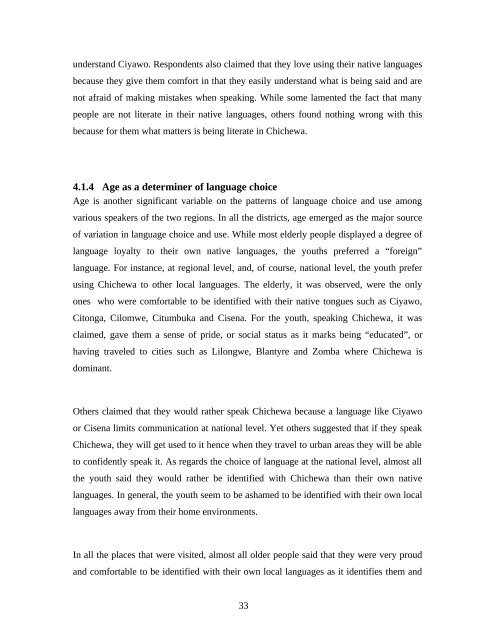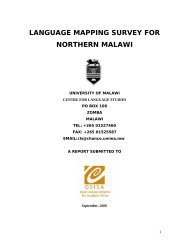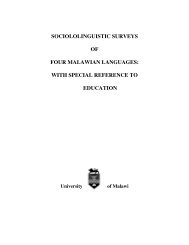Executive Summary - Centre for Language Studies
Executive Summary - Centre for Language Studies
Executive Summary - Centre for Language Studies
You also want an ePaper? Increase the reach of your titles
YUMPU automatically turns print PDFs into web optimized ePapers that Google loves.
understand Ciyawo. Respondents also claimed that they love using their native languagesbecause they give them com<strong>for</strong>t in that they easily understand what is being said and arenot afraid of making mistakes when speaking. While some lamented the fact that manypeople are not literate in their native languages, others found nothing wrong with thisbecause <strong>for</strong> them what matters is being literate in Chichewa.4.1.4 Age as a determiner of language choiceAge is another significant variable on the patterns of language choice and use amongvarious speakers of the two regions. In all the districts, age emerged as the major sourceof variation in language choice and use. While most elderly people displayed a degree oflanguage loyalty to their own native languages, the youths preferred a “<strong>for</strong>eign”language. For instance, at regional level, and, of course, national level, the youth preferusing Chichewa to other local languages. The elderly, it was observed, were the onlyones who were com<strong>for</strong>table to be identified with their native tongues such as Ciyawo,Citonga, Cilomwe, Citumbuka and Cisena. For the youth, speaking Chichewa, it wasclaimed, gave them a sense of pride, or social status as it marks being “educated”, orhaving traveled to cities such as Lilongwe, Blantyre and Zomba where Chichewa isdominant.Others claimed that they would rather speak Chichewa because a language like Ciyawoor Cisena limits communication at national level. Yet others suggested that if they speakChichewa, they will get used to it hence when they travel to urban areas they will be ableto confidently speak it. As regards the choice of language at the national level, almost allthe youth said they would rather be identified with Chichewa than their own nativelanguages. In general, the youth seem to be ashamed to be identified with their own locallanguages away from their home environments.In all the places that were visited, almost all older people said that they were very proudand com<strong>for</strong>table to be identified with their own local languages as it identifies them and33





